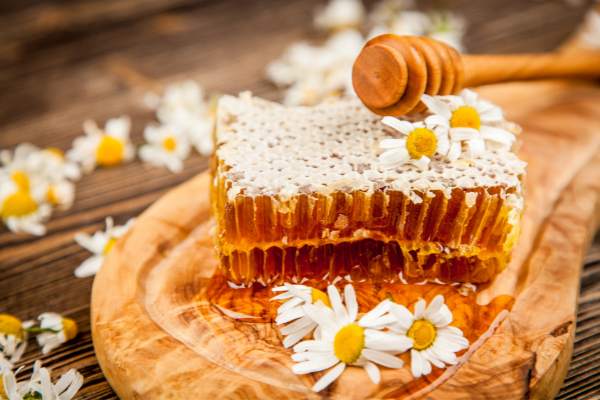Honeycomb offers natural antioxidants and essential enzymes. Consuming honeycomb may aid in digestion and boost immunity.
Honeycomb, a unique wonder of nature, features an intricate lattice of hexagonal beeswax cells filled with raw honey. Health enthusiasts often praise honeycomb for its unprocessed purity, which preserves the natural vitamins, enzymes, and nutrients found in honey. Alongside its dietary benefits, honeycomb is known for its potential to promote better digestion due to its natural wax, which contains long-chain fatty acids beneficial to the gastrointestinal tract.
The rich antioxidants in honeycomb contribute to the body’s defense mechanism against oxidative stress, supporting overall wellness. Individuals seeking natural sweeteners may find honeycomb an excellent alternative, encompassing the taste, nutrition, and health benefits in a single bite. Perfect for a wholesome addition to your diet, the inclusion of honeycomb elevates the nutrient profile of various culinary creations while enchanting taste buds with its complex flavors and textures.
The Buzz Around Honeycomb
Honeycomb is more than just a tasty treat. Its unique structure and creation process offer remarkable health benefits. Packed with nutrients, it’s a natural wonder that has captured human interest for ages. Hidden within its hexagonal shapes lie the secrets to its power, and scientists continuously find more ways it can benefit our daily health routines.
Nature’s Sweet Architecture
Bees craft honeycomb using beeswax, creating perfect hexagons. This geometric masterpiece stores honey and pollen but also holds a wealth of enzymes, vitamins, and antioxidants. The design ensures maximum storage with minimum material, reflecting nature’s efficiency.
Consuming honeycomb can offer you:
- Natural enzymes beneficial for digestion
- Antioxidants to fight free radicals
- Essential vitamins for daily health
From Bees To Table: The Journey Of Honeycomb
Honeycomb’s journey from a beehive to your kitchen is fascinating. Bees work tirelessly to create this natural sweetener. Every piece of honeycomb is the result of countless bee hours.
| Step | Process |
|---|---|
| 1 | Bees collect nectar and pollen |
| 2 | Bees produce wax and construct hexagons |
| 3 | Nectar transformed into honey |
| 4 | Honeycomb harvested by beekeepers |
| 5 | Honeycomb packaged and delivered |
When you enjoy a piece of honeycomb, you’re experiencing a journey of natural marvels. Each bite is a testament to the bees’ role in our ecosystem.
Composition Of Honeycomb
The composition of honeycomb is as fascinating as it is beneficial to our health. This natural masterpiece is not just a piece of art but also a powerhouse of nutrition. Let’s delve into the intricate makeup of honeycomb and discover what makes it so special and healthful.
Hexagonal Wonders: What Makes Up Honeycomb
Honeycomb, a marvel of engineering by bees, consists of tiny hexagonal cells. These cells are made from beeswax, created by bees from their wax glands. The structure serves as a storeroom for honey and pollen and a nursery for new bees. Every hexagon is a testament to nature’s ingenuity, offering strength and efficiency in storage.
- Beeswax: Natural wax produced by honey bees
- Honey: Sweet substance stored in the cells
- Bee Pollen: Packed with proteins and nutrients
- Royal Jelly: Secretion used to feed queen bees and larvae
- Propolis: Resinous mixture that bees use as glue
Wax And Sweetness: A Closer Look At Honeycomb’s Structure
The structure of honeycomb is both practical and beautiful. The beeswax cells store the golden honey, rich in sugars and nutrients. The wax itself has benefits, containing compounds like hydrocarbons and fatty acids.
| Component | Function | Benefits |
|---|---|---|
| Beeswax Cell Walls | Store honey and protect larvae | Antioxidant and antibacterial properties |
| Honey | Food for bees, stored energy | Natural sweetener, soothes sore throats |
| Bee Pollen | Food for bees, pollen storage | Rich in proteins, vitamins, and minerals |
By consuming honeycomb, we benefit from the full spectrum of its components. Each mouthful brings a unique blend of flavors and textures, along with a host of health advantages.
Honeycomb Vs. Liquid Honey
Bees create wonders, not just with sweet liquid honey but with the waxy hexagons of honeycomb. Many praise honey for its natural sweetness and health benefits, yet the honeycomb, where honey begins its journey, often remains unexplored. Honeycomb and liquid honey, while from the same source, offer different experiences and benefits. Let’s delve into the buzzing world of honeycomb versus liquid honey.
Taste And Texture Distinctions
Chewing honeycomb is a unique experience. Unlike liquid honey, the comb adds a crunch before reaching the sweet liquid.
- Liquid honey is smooth and flows easily.
- Honeycomb has a chewy wax structure with honey pockets.
Each serves up a distinct sensory delight. With honeycomb, expect a multisensory treat that combines texture with taste.
Nutritional Differences Explored
Honeycomb might include nutrients not found in its liquid counterpart. Since it’s consumed in its most natural form, honeycomb preserves the goodness of honey without alteration.
| Nutrient | Honeycomb | Liquid Honey |
|---|---|---|
| Beeswax | Yes | No |
| Propolis | May Contain | Less Likely |
| Pollen | Common | Filtering Reduces |
Each spoonful of honeycomb offers unprocessed flavors and potential health perks due to the retention of beeswax, propolis, and pollen.
- Beeswax contains fatty acids and alcohols beneficial for reducing cholesterol.
- Propolis, a natural resin, has anti-inflammatory and antibacterial properties.
- Pollen in honeycomb might offer allergy relief and support the immune system.
These components make honeycomb a powerhouse, with nutritional bonuses that liquid honey may lack after processing.
Digestive Wellness And Honeycomb
Honeycomb isn’t just a sweet treat. It’s a powerhouse for promoting digestive health. Packed with enzymes and prebiotics, honeycomb supports your digestive system in unique ways.
Natural Aid For Digestion
The natural enzymes found in honeycomb are digestive champions. These enzymes help break down foods in the gut, making it easier for your body to process nutrients. Here’s how honeycomb could become your gut’s best friend:
- Enhances nutrient absorption – helps your body take in vitamins and minerals.
- Alleviates digestion issues – combats common discomforts like bloating.
- Soothes the stomach – the wax in honeycomb has a calming effect.
Prebiotics In Honeycomb: Feeding Your Gut
Beyond enzymes, honeycomb contains beneficial prebiotics. These substances feed the good bacteria in your gut. Healthy gut flora is crucial for overall wellness.
| Prebiotic Benefit | Impact on Gut Health |
|---|---|
| Enhanced gut flora balance | Supports immune function and digestive health. |
| Better calcium absorption | Strengthens bones and overall structure. |
| Reduced inflammation | Minimizes gut-related issues and discomfort. |
The complex sugars in honeycomb do more than just sweeten your day. They ensure beneficial bacteria thrive.
Sweet Ally In Immunity Boosting
Honeycomb stands as a natural booster for our body’s defenses. With its myriad of health benefits, it’s no surprise that honeycomb plays a pivotal role in supporting and strengthening the immune system. Rich in natural sugars, enzymes, and nutrients, honeycomb is not only delicious but also aids in fending off various ailments. Let’s dive into the specifics of how this sweet treasure from bees can be a powerful ally in immunity boosting.
Antibacterial Properties Of Honeycomb
Honeycomb is well-known for its antibacterial properties. These properties come from the presence of hydrogen peroxide and other components in honey. When consumed, honeycomb can help fight off infections and promote healing. This is especially beneficial for cuts and wounds, where its application can speed up the recovery process.
- Produces hydrogen peroxide, a powerful antiseptic
- Contains propolis, which boosts antibacterial action
- Enhances the healing of wounds and infections
Honeycomb And The Battle Against Colds
Cold seasons bring sneezes and sniffles. Honeycomb is a natural ally against colds. Packed with antioxidants, it supports the body’s fight against cold viruses. Regular intake of honeycomb can also soothe a sore throat. The protective physical barrier it forms on the throat lining provides relief and aids in reducing inflammation.
| Benefit | Description |
|---|---|
| Antioxidant-rich | Combats free radicals, supporting the immune system |
| Soothes sore throat | Forms a protective barrier, reducing irritation and inflammation |
Antioxidants In Honeycomb
Honeycomb isn’t just a sweet treat. It’s packed with powerful antioxidants that benefit your body. These elements shield cells from damage and contribute to better health. This section explores the rich antioxidant presence in honeycomb and its positive impacts on our bodies.
Combating Oxidative Stress
Oxidative stress occurs when harmful free radicals outnumber antioxidants in your body. It can lead to cell damage and chronic diseases. Honeycomb contains antioxidants like flavonoids and phenolic acids which fight this stress. They neutralize free radicals, protecting your health.
The Role Of Antioxidants In Overall Health
Antioxidants play a crucial role in maintaining health. They are vital for:
- Strengthening the immune system
- Reducing inflammation
- Protecting against chronic diseases like heart disease and cancer
- Slowing down the aging process
By including honeycomb in your diet, you may boost your antioxidant intake. This can lead to improved health and wellness.
Easing Allergies With Local Honeycomb
The gentle buzz of bees not only brings us liquid gold but also a sweet ally against allergies. Local honeycomb may hold the key to soothing your seasonal woes. It’s the local flora, sealed within the honeycomb, that could benefit your immune system. Embracing this natural remedy might just change your relationship with spring and fall for the better.
Desensitizing Naturally Through Exposure
Local honeycomb is rich in the pollen specific to your area. Consuming it might help your body adjust to these allergens. It works like a natural vaccine. By introducing small amounts of pollen into your system, your body may learn not to overreact. This could mean fewer allergy symptoms in the long run.
Seasonal Relief Through Honeycomb Consumption
Don’t let allergies keep you indoors. Regular doses of local honeycomb could ease your sniffling and sneezing when the plants are in bloom. Let’s look at some reasons to try this sweet solution:
- Rich in pollen and potentially therapeutic compounds
- May reduce allergic response over time
- Natural and free from synthetic additives
Keep a honeycomb jar handy, especially during peak allergy seasons. A little bit each day might just lead to a more comfortable and sneeze-free season.
Natural Energy Source
Honeycomb is more than a sweet treat. It’s a natural energy booster. Packed with carbohydrates and natural sugars, it can offer a quick pick-me-up. Looking to shake off fatigue or need a pre-workout boost? Honeycomb is your friend.
Quick Energy From Honeycomb’s Sugars
Honeycomb contains glucose and fructose. These sugars absorb fast into your bloodstream. They provide an immediate energy surge. It’s different from processed sugar rushes. You get a smooth, natural increase in energy.
- Glucose for rapid fuel
- Fructose for sustained energy
Endurance Athletes And Honeycomb: A Perfect Match
Endurance athletes love honeycomb. It helps during long training sessions or races. Here’s why:
| Benefit | Description |
|---|---|
| Sustained Energy | Honeycomb’s sugars release slowly. They keep energy levels steady. |
| Easy on the Stomach | Honeycomb is natural. It’s gentler on the stomach than gels or chews. |
| Antioxidants | They fight free radicals. This protects muscles from oxidative stress during exercise. |
Heart Health And Honeycomb
Honeycomb isn’t just a sweet treat; it’s a heart helper too. This beeswax structure holds raw honey. It has nutrients that your heart loves. Let’s see what makes honeycomb a heart-healthy choice.
Promoting Good Cholesterol
Antioxidants in honeycomb can raise good HDL cholesterol. This helps your heart work better. Eating honeycomb might lead to a noticeable change. Here’s how:
- Antioxidants protect your heart
- HDL cholesterol cleans your blood vessels
- Improved heart function over time
Honeycomb’s Influence On Blood Pressure
Raw honeycomb has antioxidants that can help manage blood pressure. Natural sugars work differently than processed ones. They don’t spike your blood pressure the same way. Here’s a look at honeycomb’s potential:
| Component | Effect on Blood Pressure |
|---|---|
| Antioxidants | May help dilate arteries |
| Natural Sugars | Support stable blood pressure levels |
Incorporating Honeycomb Into Your Diet
Are you excited to explore the sweet world of honeycomb? It’s not just delicious but also a treasure trove of health benefits. Packed with natural enzymes, nutrients, and antioxidants, honeycomb can be more than just a treat. It’s time to learn how to make honeycomb a yummy part of daily meals.
Creative Ways To Enjoy Honeycomb
Elevate your breakfast, snacks, and desserts with these fun ideas:
- Spread it on toast: Replace processed sugar with a slab of honeycomb.
- Top off your oatmeal: A chunk of honeycomb melts into warm porridge for a natural sweetener.
- Upgrade cheese platters: Pair honeycomb with cheeses for a gourmet experience.
- Boost smoothies: Blend small pieces for added sweetness and nutrition.
- Indulge in desserts: Garnish cakes or ice cream with honeycomb chunks.
Pairing Honeycomb: Tips And Tricks
Enhance flavors and textures in your dishes with these pairing tips:
| Food Type | Pairing Suggestion |
|---|---|
| Cheeses | Brie, blue cheese, or goat cheese balance nicely. |
| Drinks | Add a small piece to hot tea or a cocktail. |
| Meats | Glaze chicken or pork for a touch of sweetness. |
| Fruits | Pairs well with figs, apples, or berries. |
| Breads | Amp up banana bread or muffins with honeycomb. |
Frequently Asked Questions On Health Benefits Of Honeycomb
What Are Honeycomb’s Nutritional Benefits?
Honeycomb is rich in carbohydrates, specifically natural sugars, and contains trace enzymes, minerals, vitamins, and antioxidants that support overall health.
Can Honeycomb Aid Digestion?
Yes, honeycomb contains beeswax with compounds that may assist in digestive process and promote gut health.
Is Honeycomb Good For Allergies?
Raw honeycomb may have pollen that can potentially help reduce pollen-related allergy symptoms through gradual exposure.
Conclusion
Embracing the sweetness of honeycomb goes beyond taste. This natural wonder offers a bounty of health perks, from antioxidants to liver support. Including it in your diet could mean embracing a delicious ally for wellness. Let nature’s own golden lattice be a stepping stone to a healthier you.
Remember, moderation is key to reaping benefits without overindulging.


